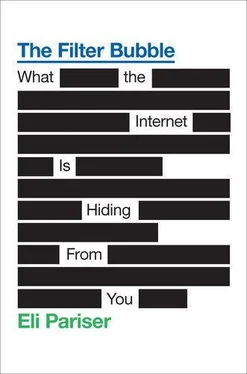7 96 percent of Americans:Richard Behar, “Never Heard of Acxiom? Chances Are It’s Heard of You.” Fortune, Feb. 23, 2004, accessed Dec. 19, 2010, http://money.cnn.com/magazines/fortune/fortune_archive/2004/02/23/362182/index.htm.
8 Netflix can predict:Marshall Kirkpatrick, “They Did It! One Team Reports Success in the $1m Netflix Prize,” ReadWriteWeb , June 26, 2009, accessed Dec. 19, 2010, www.readwriteweb.com/archives/they_did_it_one_team_reports_success_in_the_1m_net.php.
8 Web site that isn’t customized… will seem quaint:Marshall Kirpatrick, “Facebook Exec: All Media Will Be Personalized in 3 to 5 Years,” ReadWriteWeb , Sept. 29, 2010, accessed Jan. 30, 2011, www.readwriteweb.com/archives/facebook_exec_all_media_will_be_personalized_in_3.php.
8 “now the web is about ‘me’”:Josh Catone, “Yahoo: The Web’s Future Is Not in Search,” ReadWriteWeb, June 4, 2007, accessed Dec. 19, 2010, www.readwriteweb.com/archives/yahoo_personalization.php.
8 “tell them what they should be doing”:James Farrar, “Google to End Serendipity (by Creating It),” ZDNet, Aug. 17, 2010, accessed Dec. 19, 2010, www.zdnet.com/blog/sustainability/google-to-end-serendipity-by-creating-it/1304.
8 are becoming a primary news source:Pew Research Center, “Americans Spend More Time Following the News,” Sept. 12, 2010, accessed Feb 7, 2011, http://people-press.org/report/?pageid=1793.
8 million more people joining each day:Justin Smith, “Facebook Now Growing by Over 700,000 Users a Day, and New Engagement Stats,” July 2, 2009, accessed Feb. 7, 2011, www.insidefacebook.com/2009/07/02/facebook-now-growing-by-over-700000-users-a-day-updated-engagement-stats/.
8 biggest source of news in the world:Ellen McGirt, “Hacker. Drop out. CEO,” Fast Company, May 1, 2007, accessed Feb. 7, 2011, www.fastcompany.com/magazine/115/open_features-hacker-dropout-ceo.html.
11 information: 900,000 blog posts, 50 million tweets:“Measuring tweets,” Twitter blog , Feb. 22, 2010, accessed Dec. 19, 2010, http://blog.twitter.com/2010/02/measuring-tweets.html.
11 60 million Facebook status updates, and 210 billion e-mails:“A Day in the Internet,” Online Education, accessed Dec. 19, 2010, www.onlineeducation.net/internet.
11 about 5 billion gigabytes:M. G. Siegler, “Eric Schmidt: Every 2 Days We Create as Much Information as We Did up to 2003,” TechCrunch blog, Aug. 4, 2010, accessed Dec. 19, 2010, http://techcrunch.com/2010/08/04/schmidt-data.
11 two new stadium-size complexes:Paul Foy, “Gov’t Whittles Bidders for NSA’s Utah Data Center,” Associated Press, Apr. 21, 2010, accessed Dec. 19, 2010, http://abcnews.go.com/Business/wireStory?id=10438827&page=2.
11 new units of measurements:James Bamford, “Who’s in Big Brother’s Database?,” The New York Review of Books, Nov 5, 2009, accessed Feb. 8, 2011 , www.nybooks.com/articles/archives/2009/nov/o5/whos-in-big-brothers-database.
11 the attention crash:Steve Rubel, “Three Ways to Mitigate the Attention Crash, Yet Still Feel Informed,” Micro Persuasion (Steve Rubel’s blog), Apr. 30, 2008, accessed Dec. 19, 2010, www.micropersuasion.com/2008/04/three-ways-to-m.html.
13 “back in the bottle”:Danny Sullivan, phone interview with author, Sept 10, 2010.
13 part of our daily experience:Cass Sunstein, Republic.com 2.0. (Princeton: Princeton University Press, 2007).
13–14 “skew your perception of the world”:Ryan Calo, phone interview with author, Dec. 13, 2010.
14 “the psychological equivalent of obesity”:danah boyd, “Streams of Content, Limited Attention: The Flow of Information through Social Media,” speech, Web 2.0 Expo. (New York: 2009), accessed July 19, 2010, www.danah.org/papers/talks/Web2Expo.html.
15 “strategically time” their online solicitations:“Ovulation Hormones Make Women ‘Choose Clingy Clothes,’” BBC News, Aug. 5, 2010, accessed Feb: 8, 2011, www.bbc.co.uk/news/health-10878750.
16 third-party marketing firms:“Preliminary FTC Staff Privacy Report,” remarks of Chairman Jon Leibowitz, as prepared for delivery, Dec. 1, 2010, accessed Feb. 8, 2011, www.ftc.gov/speeches/leibowitz/101201privacyreportremarks.pdf.
16 Yochai Bentler argues:Yochai Benkler, “Siren Songs and Amish Children: Autonomy, Information, and Law,” New York University Law Review, Apr. 2001.
17 tap into lots of different networks:Robert Putnam, Bowling Alone: The Collapse and Revival of American Community (New York: Simon and Schuster, 2000).
17 “make us all next door neighbors”:Thomas Friedman, “It’s a Flat World, After All,” New York Times, Apr. 3, 2005, accessed Dec. 19, 2010, www.nytimes.com/2005/04/03/magazine/03DOMINANCE.html?pagewanted=all.
17 “smaller and smaller and faster and faster”:Thomas Friedman, The Lexus and the Olive Tree (New York: Random House, 2000), 141.
18 “closes the loop on pecuniary self-interest”:Clive Thompson, interview with author, Brooklyn, NY, Aug. 13, 2010.
18 “Customers are always right, but people aren’t”:Lee Siegel, Against the Machine: Being Human in the Age of the Electronic Mob (New York: Spiegel and Grau, 2008), 161.
18 thirty-six hours a week watching TV:“Americans Using TV and Internet Together 35% More Than A Year Ago,” Nielsen Wire, Mar. 22, 2010, accessed Dec. 19, 2010, http://blog.nielsen.com/nielsenwire/online_mobile/three-screen-report-q409.
19 “civilization of Mind in cyberspace”:John Perry Barlow, “A Cyberspace Independence Declaration,” Feb. 9, 1996, accessed Dec. 19, 2010, http://w2.eff.org/Censorship/Internet_censorship_bills/barlow_0296.declaration.
19 “code is law”:Lawrence Lessig, Code 2.0 (New York: Basic Books, 2006), 5.
Chapter One: The Race for Relevance
21 “If you’re not paying for something”: MetaFilter blog, accessed Dec. 10, 2010, www.metafilter.com/95152/Userdriven-discontent.
22 “vary sex, violence, and political leaning”:Nicholas Negroponte, Being Digital (New York: Knopf, 1995), 46.
22 “the Daily Me”:Ibid., 151.
22 “Intelligent agents are the unequivocal future”:Negroponte, Mar. 1, 1995, e-mail to the editor, Wired.com, Mar. 3, 1995, www.wired.com/wired/archive/3.03/negroponte.html.
23 “The agent question looms”:Jaron Lanier, “Agents of Alienation,” accessed Jan. 30, 2011, www.jaronlanier.com/agentalien.html
24 twenty-five worst tech products:Dan Tynan, “The 25 Worst Tech Products of All Time,” PC World, May 26, 2006, accessed Dec. 10, 2010, www.pcworld.com/article/125772-3/the_25_worst_tech_products_of_all_time.html#bob.
24 invested over $100 million:Dawn Kawamoto, “Newsmaker: Riding the next technology wave,” CNET News, Oct. 2, 2003, accessed Jan. 30, 2011, http://news.cnet.com/2008-7351-5085423.html.
25 “he’s a lot like John Irving”:Robert Spector, Get Big Fast (New York: HarperBusiness, 2000), 142.
25 “small Artificial Intelligence company”:Ibid., 145.
Читать дальше











